What is the best way to rebuild Kenya women's basketball program?
NAIROBI (Kenya) - Why is Kenya - a team that finished second in the FIBA Women's AfroBasket 1992 in Dakar and finished fourth in 1997 in Nairobi - now struggling to win games?
NAIROBI (Kenya) - Why is Kenya - a team that finished second in the FIBA Women's AfroBasket 1992 in Dakar and finished fourth in 1997 in Nairobi - now struggling to win games?
This has prompted Kenyans to look for answers.
The performance of the Kenya national women’s team - the Lionesses - in their last FIBA Women's AfroBasket in Dakar, Senegal last August was worrying.
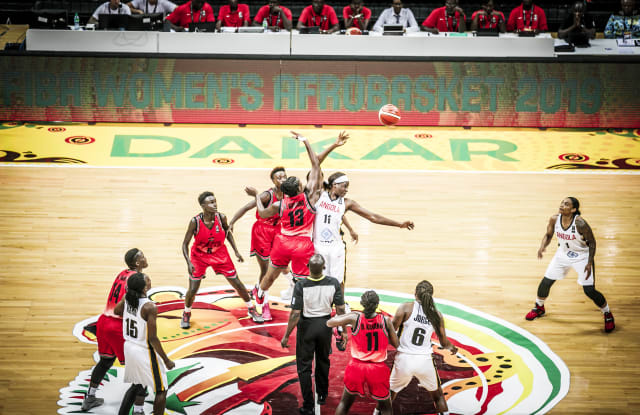
And with the race for the next biennial tournament set to start in February with the Zone Five Preliminary Round, nobody knows what to expect. Talk is ripe about rebuilding if the country is to regain its glory in the continent.
The poor showing started in the 2007 event also held in the same city of Dakar. Kenya had another gloomy outing finishing last and even lost to Madagascar.
They failed to win a single game in Dakar in 2019 going down 55-39 to Mozambique, 64-51 to Angola and 64-57 to Cape Verde and missed out on the Quarter-Finals slot.
But what is the best way to rebuild?
Is it about time to overhaul the team by injecting some young blood? Can the new faces stand the onslaught staged by the more experienced sides in the continent?
How does the changes come? Which would be helpful- gradual or total overhaul? These are questions on the minds of many that needs to be resolved sooner rather than later.
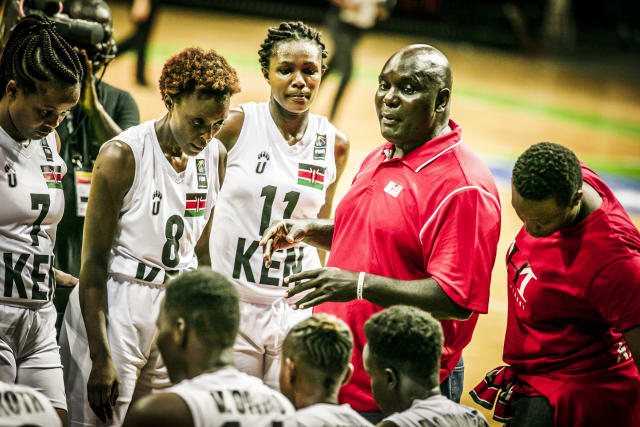 Ronnie Owino (Kenya)
Ronnie Owino (Kenya)
Going forward, the long serving head coach Ronnie Owino who travelled with only 10 players to the FIBA Women's AfroBasket in Dakar last year revealed that there is need to rebuild the team.
"There is need to have new players injected into the team depending on need (ability and position). It will have to be earned based purely on merit," said the former Kenyan international.
He went on, "We have players who have been in the provisional list and have trained with the national side before and they have decent talent."
The former point guard, who represented his country at FIBA AfroBasket 1985, observes that the team needs to have consistent shooters and dominant post players. This though has been lacking.
"A good team needs shooters, consistency in three-point when open, lockdown defender to match up with opposition leading scorers. At present Kenya do not have this," Owino said, also emphasizing the need for a versatile player who can play in the post when playing as a forward on smaller opponents and hit the mid range shot when playing at power forward.
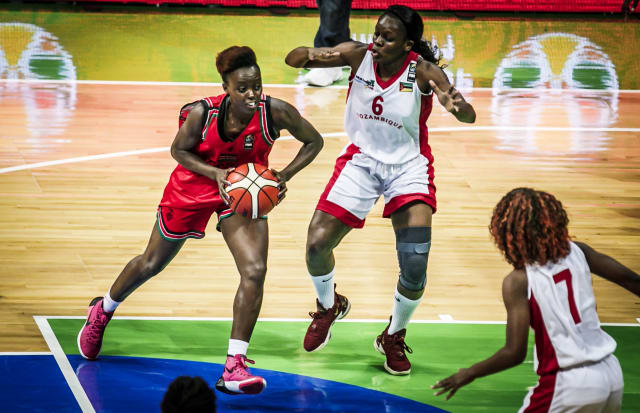
Owino noted that there are certain roles that were not really fulfilled well during the Dakar Championship and must be worked on going forward.
"The issue of slow legs on one hand and experience on the other. Inevitably a team must reinvent itself by rebuilding continuously," he observed.
The tactician said that a team must have a balance of experienced players and young vibrant rookies ready to represent the team and good enough to wear the colours of the flag. There must be merit and the upcoming players must earn their slots by putting in the work.
However, Owino does not advocate for total overhaul only saying the process has to be gradual and demanded by need and position.
"National team is not a preserve of a 'select few' and the current crop of players must continuously prove that they deserve to be there," he explained.
"We cannot afford to have a situation of the big name syndrome. All the players must earn their stripes and fulfil their roles in the team be it defense/offense etc. In the National team, we do not have ‘sacred’ players."
Kenya and Senegal, he noted, had the oldest players in the tournament with an average age of 30 years. Tunisia and Egypt had the youngest at 23 years.
 Egypt team registered an age average of 23 during the 2019 FIBA Women's AfroBasket in Dakar
Egypt team registered an age average of 23 during the 2019 FIBA Women's AfroBasket in Dakar
"The younger teams exhibited up tempo games throughout the series as they had fresh legs. We must strike a balance between youth and experience. After all you can't buy experience," Owino noted.
He added that the younger players must be given the chance/exposure but merit must be considered in everything.
Assistant coach Evelyne Kedogo concurs: "Both club and national team need young players to be included in their teams but it must be gradual. The young need to learn. Experience come with both game intelligence and game maturity. You do not get that from young players."
Between 1992 and 1994 Kenya assembled their best team ever winning silver in the FIBA Women's AfroBasket in Dakar. They put up a performance that has since remained unmatched.
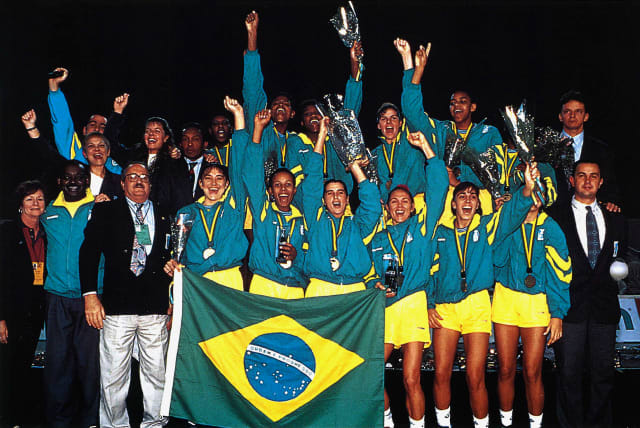 Brazil won the FIBA Women's Basketball World Cup 1994 in Australia where Kenya finished 0-8
Brazil won the FIBA Women's Basketball World Cup 1994 in Australia where Kenya finished 0-8
The team under the tutelage of the late Tom Munyama lost in to the host. Their reward was a ticket to the FIBA Women's Basketball World Cup 1994 in Adelaide, Australia.
Kenya were the sole representative from Africa in the global festival where they lost all their matches but made many friends in the process.
"They were complete with good players in all departments from point guards, shooting guards, forwards and centers. There was too much talent in one team," Owino recalls.
The likes of Queen Olumbo, Susan Kariuki, Catherine Shava, Bertha Akuno, the late Caroline Omamo, Nasila Achieng, Alice Onono, Mirram Owuor, Celestine Imbaya, Sophie Mohammed, Petronela Muthoni and Jane Makale.
"The current team lacks this. For example we don't have a dominant post player who can cause havoc in the paint and we don't have a consistent shooter knocking down the three point ball. The point guard position must improve drastically if we are to make an impact in Africa," Owino, a FIBA Africa coaches instructor pointed out.
Kenya, he said, has talent that can compete with top Africa countries but must bring in diaspora players to give themselves a fighting chance. The way the Morans have done with great success.
"Professionals is the way to go," he said. "Morans did well in their two tournaments because they brought home diaspora players who returned with the much needed experience gained from playing in the leagues abroad."
Already USA based former international Peter Kiganya, who starred for Abilene Christian University (ACU) and had professional stint in Argentina, Uruguay, Chile, and Paraguay, is scouting the players.
"We need to get our players out there to enable us field the strongest team possible. All the other countries bring in their professional players. Champions Nigeria have only two players in the team based in Nigeria," he said.
Here is also need to have the team prepared adequately for the job in hand; at least one year before a championship.
"We must stop inadequate preparations. Competing against teams that have been camping and playing friendlies in Europe when we only play high school teams is not the solution," he quipped. "Our last preparation was inadequate. The team needs to be well taken care of financially, physically and mentally. They must also be paid their allowances.
"It should be an honor to play for the national team. The national team should not be a place of lamentation and procrastinating."
Kenya had only 10 players in the Senegal show and one player Velma Achieng got sick. So Owino had to use nine players at some point.
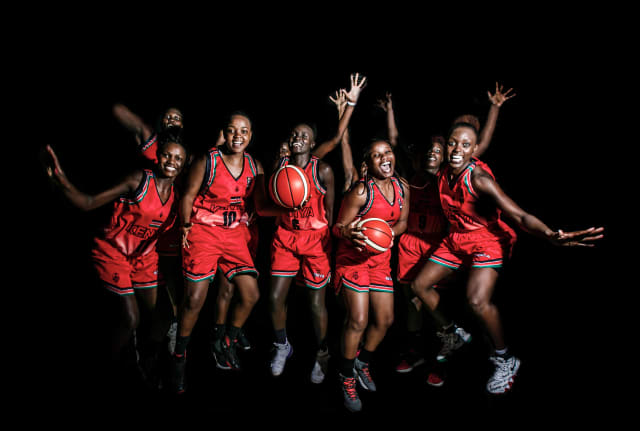 Kenya team
Kenya team
"Obviously this affected our performance in terms of rotation and game strategy," he said.
Owino, one of the finest tacticians in the continent said that with proper mentoring and a planned structured rebuilding, the young talents are ready to impact the team positively.
"We have players who went to Morocco for the All-Africa Games and did extremely well on the 3 on3. We only need to nurture it."
Among the players he will consider for the national team duty include Jemima Knight, Caroline Njeri, Daisy Ayodi, Clara Rotich and Melvin Iminza. Others are Christine Akinyi, Beryl Aoko, Maryanne Nyagaki, Joy Mupalia, Mary Shibweche, Edna Kola and Valerie Kemunto.
"These players have been identified in the league so the league provides an opportunity for the players to showcase their talent."
The Kenya Basketball Federation (KBF) and Kenya Universities Sports Association (KUSA) league provides enough games for budding talent to be uncovered.
Owino concludes: "There is need to strike a delicate balance between experience and youth. Rebuilding is a must and is a continuous process. No total overhaul."
FIBA